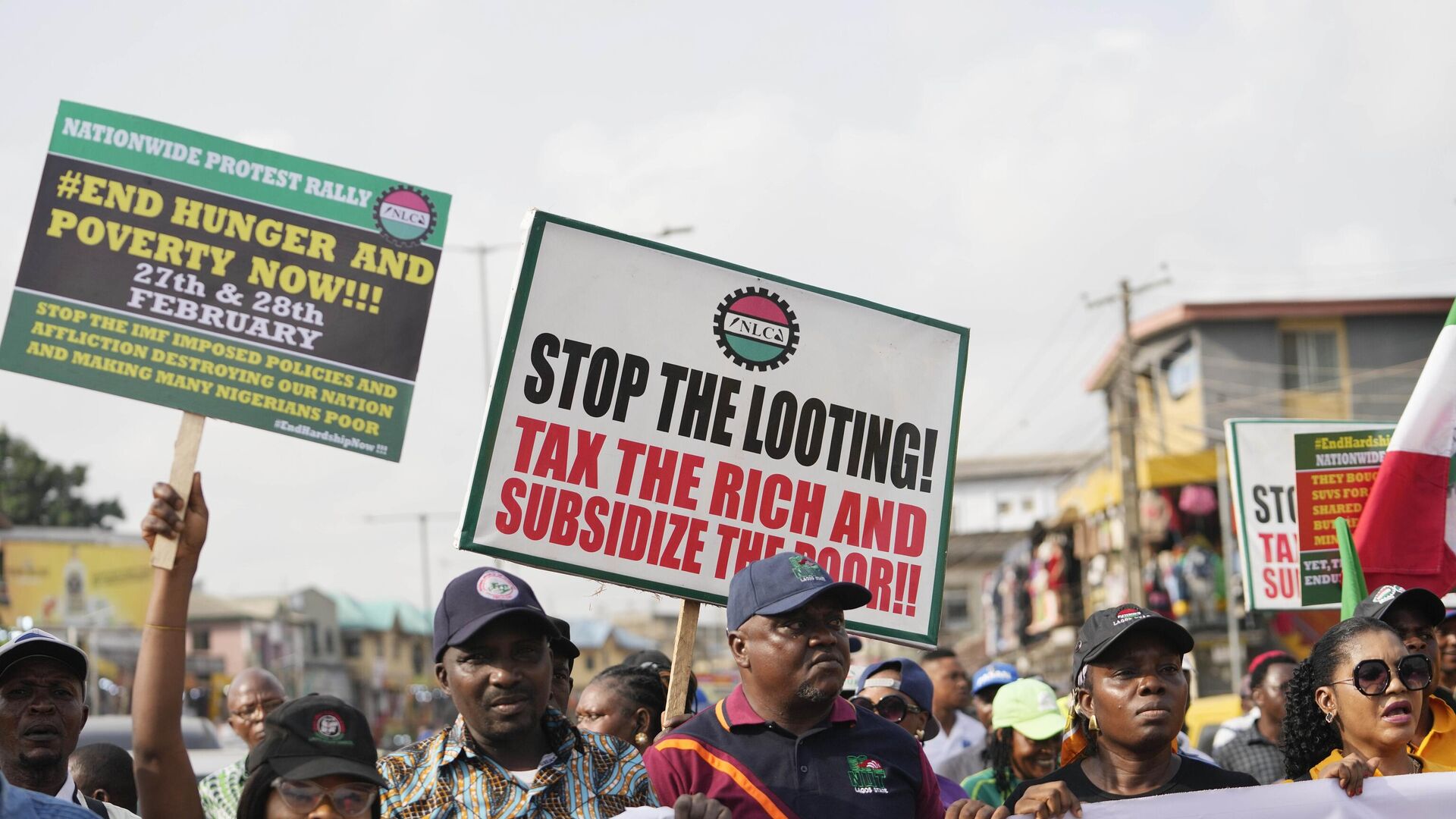https://en.sputniknews.africa/20240719/nigeria-approves-new-minimum-wage-amid-economic-turbulence-labor-unrest-1067553283.html
Nigeria Approves New Minimum Wage Amid Economic Turbulence, Labor Unrest
Nigeria Approves New Minimum Wage Amid Economic Turbulence, Labor Unrest
Sputnik Africa
The minimum wage was raised for the second time in the past year. In September 2023, the 30,000 naira (about $18.35) that has been in place since 2019 was... 19.07.2024, Sputnik Africa
2024-07-19T14:13+0200
2024-07-19T14:13+0200
2024-07-19T14:29+0200
sub-saharan africa
nigeria
west africa
bola tinubu
minimum wage
legislation
reforms
salary
government
politics
https://cdn1.img.sputniknews.africa/img/07e8/07/13/1067553092_0:0:3072:1728_1920x0_80_0_0_aec161b69101851b4dd9c629a283dca7.jpg
Nigeria's largest labor unions agreed Thursday to a new minimum wage of 70,000 naira ($44) a month, ending months of negotiations and strikes.The compromise was reached during negotiations between the government and the country's largest labor unions, the Nigerian Labour Congress (NLC) and the Trade Union Congress (TUC), on Thursday in Abuja, "the second time the parties met in seven days," Onanuga added.The unions requested that the minimum salary be set at 250,000 naira ($153). Ahead of the talks, labor union activists staged major demonstrations around the country, including road blockades and power cuts. The unions postponed their strike in early June to negotiate but warned that failure to reach an agreement could force them to return to action.He additionally said that the next minimum wage would be considered in three years, rather than the typical five.Nigerian labor unions started an indefinite strike owing to the government's failure to raise the minimum monthly pay above 60,000 naira ($36.81). The unions have been demanding 615,000 naira (more than $400). Their representatives contend that the sum recommended by the government barely covers the daily cost of bread. They believe that the government's offered pay is merely enough to cover workers' basic requirements.Employers, on the other hand, refer to growing unemployment, which now exceeds 17%. Under such circumstances, they argue that the unions' attitude jeopardizes the stability of legal positions, as many people are now ready to work without a formal contract for very little compensation, sometimes as little as $5 per month.Skyrocketing prices and a weakening currency over the past year have led to a surge in inflation, shrinking incomes, and severe hardship for workers, leaving millions of Nigerians struggling to satisfy their basic needs.Despite the economic situation, Tinubu has said that he would not reverse controversial initiatives, such as electricity and fuel price increases.
nigeria
west africa
Sputnik Africa
feedback@sputniknews.com
+74956456601
MIA „Rossiya Segodnya“
2024
News
en_EN
Sputnik Africa
feedback@sputniknews.com
+74956456601
MIA „Rossiya Segodnya“
Sputnik Africa
feedback@sputniknews.com
+74956456601
MIA „Rossiya Segodnya“
nigeria, west africa, bola tinubu, minimum wage, legislation, reforms, salary, government, politics, economy
nigeria, west africa, bola tinubu, minimum wage, legislation, reforms, salary, government, politics, economy
Nigeria Approves New Minimum Wage Amid Economic Turbulence, Labor Unrest
14:13 19.07.2024 (Updated: 14:29 19.07.2024) The minimum wage was raised for the second time in the past year. In September 2023, the 30,000 naira (about $18.35) that has been in place since 2019 was temporarily increased to 65,000 naira ($40) by the federal government as part of the minimum wage subsidy.
Nigeria's largest labor unions agreed Thursday to a new minimum wage of 70,000 naira ($44) a month, ending months of negotiations and strikes.
"President Bola Tinubu has approved a 70,000 naira minimum wage for Nigerian workers with a promise to review the national minimum wage law every three years," Senior Presidential Aide Bayo Onanuga announced on X.
The compromise
was reached during negotiations between the government and the country's largest labor unions, the Nigerian Labour Congress (NLC) and the Trade Union Congress (TUC), on Thursday in Abuja, "the second time the parties met in seven days," Onanuga added.
"The labor leaders applauded President Tinubu for the fatherly gesture, as the president also promised to use his discretionary powers to meet the demands of university unions concerning unpaid four months' salaries," the presidential aide said.
The unions requested that the minimum salary be set at
250,000 naira ($153). Ahead of the talks, labor union activists staged major
demonstrations around the country, including road blockades and power cuts. The unions postponed their strike in early June to negotiate but warned that failure to reach an agreement could force them to return to action.
"We are taking this new 70,000 naira minimum wage with mixed feelings because of the situation of the economy. We have to move ahead despite the situation; otherwise, the negotiation can linger," NLC President Joe Ajaero told reporters.
He additionally said that the next minimum wage would be considered in three years, rather than the typical five.
Nigerian labor unions started an indefinite strike owing to the government's failure to raise the minimum monthly pay above 60,000 naira ($36.81). The unions have been demanding 615,000 naira (more than $400). Their representatives contend that the sum recommended by the government barely covers the daily cost of bread. They believe that the government's offered pay is merely enough to cover workers' basic requirements.
Employers, on the other hand, refer to growing unemployment, which now exceeds 17%. Under such circumstances, they argue that the unions' attitude jeopardizes the stability of legal positions, as many people are now ready to work without a formal contract for very little compensation, sometimes as little as $5 per month.
Skyrocketing prices and a weakening currency over the past year have
led to a surge in inflation, shrinking incomes, and severe hardship for workers, leaving millions of Nigerians struggling to satisfy their basic needs.
Despite the economic situation, Tinubu has said that he would not reverse controversial initiatives, such as electricity and fuel price increases.

